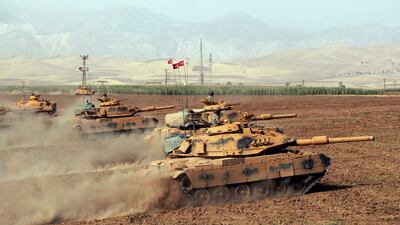Five Turkish soldiers serving in northern Iraq as part of operations against Kurdish militants were killed on Tuesday, the defence ministry said on Wednesday.
Another two soldiers were wounded during fighting, the ministry statement said. It did not say where the clash had occurred.
Turkey’s official news agency, Anadolu, said the soldiers had clashed with fighters from the Kurdistan Workers’ Party (PKK), which Ankara says is a terrorist organisation.
The PKK has training camps and bases in autonomous Iraqi Kurdistan and has waged an insurgency against the Turkish state since 1984.
About 40,000 people, many of them civilians, have been killed in the conflict.
Ankara has launched several operations against PKK fighters in Iraq and Syria, the latest of which began in northern Iraq last month.
Much of the fighting takes place in remote mountainous areas, but local Iraqi-Kurdish civilians have sometimes been killed or injured by Turkish air strikes. This has angered locals, many of whom do not support the PKK.
The Kurdish Democratic Party, the largest Kurdish party in the semi-autonomous Kurdish Region of Iraq, has increasingly found itself at odds with the PKK.
The KDP has strong energy ties with Ankara and its tolerance of Turkish military action has led to clashes between the KDP's Peshmerga fighters and the PKK. The PKK now finds itself increasingly isolated in northern Iraq.
This month, Iraqi forces, which increasingly co-operate with the Peshmerga, clashed with a small militia allied to the PKK in the contested Iraqi town of Sinjar.
Despite this, several major political parties in Baghdad have expressed strong objections to the Turkish military presence in Iraq.
On Wednesday, Ankara’s ambassador to Baghdad, Ali Riza Guney, countered in a meeting with Iraqi politician Najem Al Jubouri that the operations to root out the PKK would bolster Iraqi sovereignty in the long run.
The Turkish escalation in northern Iraq comes amid a wider push by Ankara against Kurdish militia groups in the region.
Turkish President Recep Tayyip Erdogan said on Monday that Turkey would soon launch a new military operation into northern Syria.
He said this would create a 30-kilometre “security zone” along the border.
Since 2016, Turkey has also launched three offensives into northern Syria against the People’s Protection Units (YPG), a Syrian-Kurdish group it considers to be part of the PKK.
Turkey wants to use these security zones to keep Kurdish militants at a safe distance – and to house some of the 3.7 million Syrian refugees currently sheltering inside its own borders.













